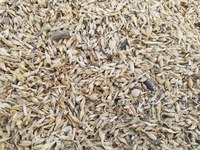Avoid Introducing Weed Seeds through Livestock Feed
(Click the image below to view a high-resolution image that can be downloaded)
Cattle, sheep and goat producers need to be on the lookout to make sure Palmer amaranth, leafy spurge and other invasive weed seeds don’t sneak in with feed. The Minnesota Department of Agriculture determined that Palmer amaranth found its way into a soybean field through cattle manure. The cattle had been fed screenings from contaminated sunflower seed.
“Weed seeds can be present in some feeds -- for example, grain screenings or dockage,” says Karl Hoppe, North Dakota State University Extension livestock systems specialist based at the Carrington Research Extension Center (CREC).
“Sometimes when the whole seed is fed, the hard outside seed coat protects the seed from being digested and the viable seed passes out in the manure,” Hoppe says. “When cattle are grazing, they can place manure patties throughout the pasture. Essentially, intact seeds could escape digestion and the animal can seed all parts of the pasture with the weed seeds that are able to germinate.
“That’s why screenings need to be ground with a hammer mill – to break up the seeds and increase digestibility.”
The second way weed seeds can avoid digestion is that they germinate where they’re fed but not actually eaten by the animals. When given the right conditions, these seeds can germinate at the feeding site.
Hay and other forages also may contain weeds and their seeds. The weeds, if cut when mature, would have viable seeds, he says.
When feeding livestock in pens, the manure should be contained and composted, says Mary Keena, Extension livestock environmental management specialist also based at the CREC. When composted correctly and appropriate compost temperatures are attained, the weed seeds lose the ability to germinate. Search for “NDSU composting animal manures” for instructions.
Weed seeds can create additional problems for livestock, says Gerald Stokka, Extension veterinarian and livestock stewardship specialist. For example, Palmer amaranth-infested alfalfa has the same toxicity as redroot pigweed. This family of weeds accumulates nitrates and can cause kidney damage.
In summary, Hoppe says, “Buy grain clean and screened without dockage. But if you do buy grain screenings, be sure to grind (hammer mill) the screenings to destroy the weed seeds.”
NDSU Agriculture Communication -- April 30, 2019
| Source: | Karl Hoppe, 701-652-2951, karl.hoppe@ndsu.edu |
|---|---|
| Source: | Mary Keena, 701-652-2951, mary.keena@ndsu.edu |
| Source: | Gerry Stokka, 701-231-5082, gerald.stokka@ndsu.edu |
| Editor: | Becky Koch, 701-231-7875, becky.koch@ndsu.edu |


